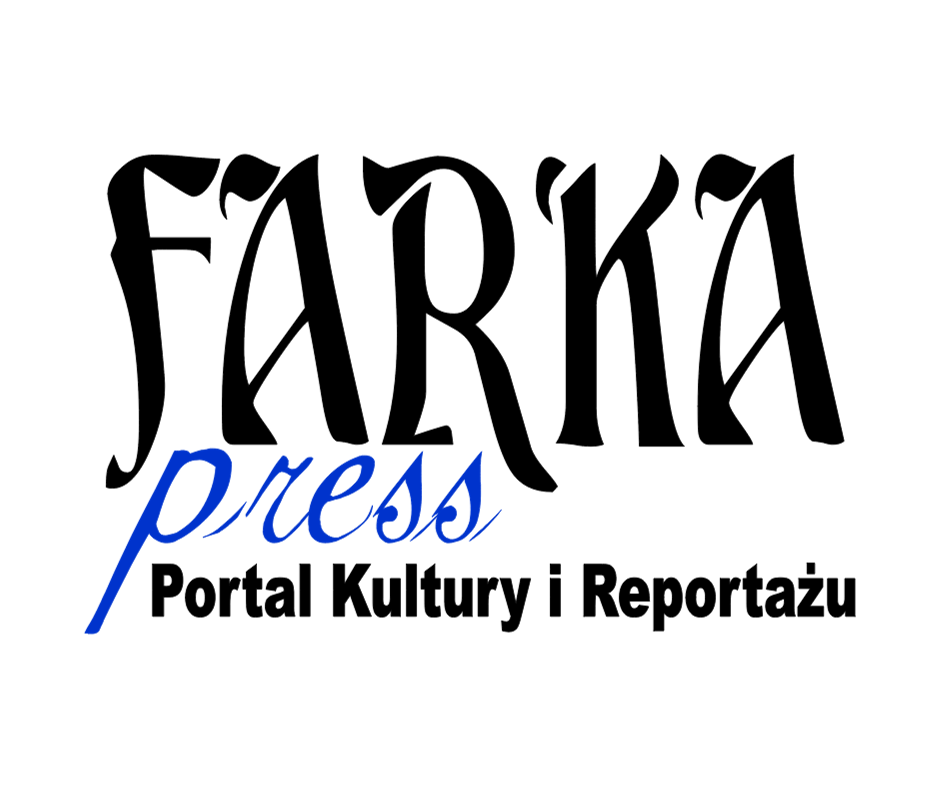Second generation
– young Greeks talk about their parents and the experience of being a child of immigrants
Translation: Anna Sykulska
The 1990s was the first period in the history of modern Greece in which the migration balance turned in favour of the country. During this period, Greece welcomed emigrants who came from former Eastern Bloc countries and also those who came from developing countries. As in recent years, the country then became a new home for thousands of people who wanted a better life for themselves and their families.Today, we are able to find out from adult representatives of the second generation of emigrants living in Greece how their lives were going and also what emigration of parents meant for their children.
Rabab
Both my parents came to Greece in the 1990s. A lot of Moroccan people decided to emigrate to Greece during this time because Greece was one of the few European countries where Moroccan citizens could enter without visas, only with a passport – Rabab explains. – It was also easy to find a job here, but the problem was to legalize the residence. Difficulties associated with the documents were the reason why many people decided to continue emigrating to Spain, France, or Italy. My parents decided to stay in Greece because they both found a job quickly and they had patience when it comes to local bureaucracy. It took them over 7 years to legalize their stay.
Rabab has just completed her first degree in mass communication, now she is working in a hostel and she is saving money to continue her studies.
Rabab’s mother comes from a poor family that lives in the slum district of Casablanca. – When I asked her why she decided to leave, she always replied that she wanted to work, gain independence, and be able to support the family financially. I believe my mother was also concerned about getting married early – it was a big problem in her family – Grandma was forced to marry my grandfather at age 11.
Sending one of the children to Europe was Rabab’s mother’s idea. – If we have someone in Europe, we may not be rich, but we will not be poor either – she thought. Mom really wanted to go, but grandmother decided to send her eldest brother to Greece first. However, something was wrong with his papers and he didn’t manage to complete the formalities. Then, my mom’s grandmother came to help my mom, she convinced her daughter to the idea; grandpa didn’t mind, so mom left.
When Rabab’s mother came to Athens, she was 21 years old. When she came to Greece, she started wearing trousers, cut her hair, and found a job as a housekeeper who was living in a room at her employer’s house. After 4 years, she started working for the family where she cleans until now.
My father came to Greece after serving in the army for ten years. At that time, he took part in the war with Western Sahara. His favourite story from those years was that one of the heat in the desert, during which it was so hot that they fried eggs in helmets together with other soldiers. My father was telling us stories from the army so often that my brother and I found them terribly boring – laughs Rabab.
For my father, joining the army was a form of escape from a difficult situation at home – she continues after a while. – The time in the army was also very difficult for him, enough difficult that he decided to leave the country after leaving the service.
After coming to Greece, firstly my father worked in the fields, he was picking vegetables and fruits, then he moved to Athens, where he worked in various jobs: he distributed pizza, worked on a construction site, and finally my father opened his own business – he runs a small company offering staircase cleaning.
My parents got to know each other through a common friend, they both thought about the wedding at that time, so their relationship was very serious from the very beginning.
I saw the film from their wedding many times, when I was little, we often watched it. The ceremony gathered the entire Moroccan community. Those were their happiest years. There were very few Moroccans in Athens at that time, most of them were young people, eager to make new contacts. They all knew each other or had common friends. It was a time of joy, a time of weddings. Many of my mother’s friends married Pakistani, Egyptians, or other Arabs – Rabab says. As time passed, friends started to start families, children started to be born, people became distant from each other. Now they meet only among their closest friends.
I miss this sense of community, the presence of people with similar experiences and aspirations. There aren’t many people from North Africa in Athens. Most of my friends are Greek. We have many different experiences, sometimes it is difficult for them to understand the consequences of coming from such a family rather than another. I would like to have a friend with the same experience as mine – whose parents emigrated from Morocco and moved to Greece – she adds.
According to Rabab, her parents identify themselves mainly as immigrants. – They admit that they couldn’t live in Morocco anymore, but on the other hand ,they are not and do not feel Greek. I have citizenship, I can stay here, I can be Greek – they don’t, they have to apply for a residence permit every few years.
After all, parents found their place here. Last year they bought an apartment. So did I, although I have never felt 100% as Greek, I consider Athens my home. I think who I am now – the way I speak, the way I think is more Greek. On the other hand, it seems to me that because I live here, I have to care more about my Moroccan identity. The fact that it is being attacked in some way makes me even keener to show it.
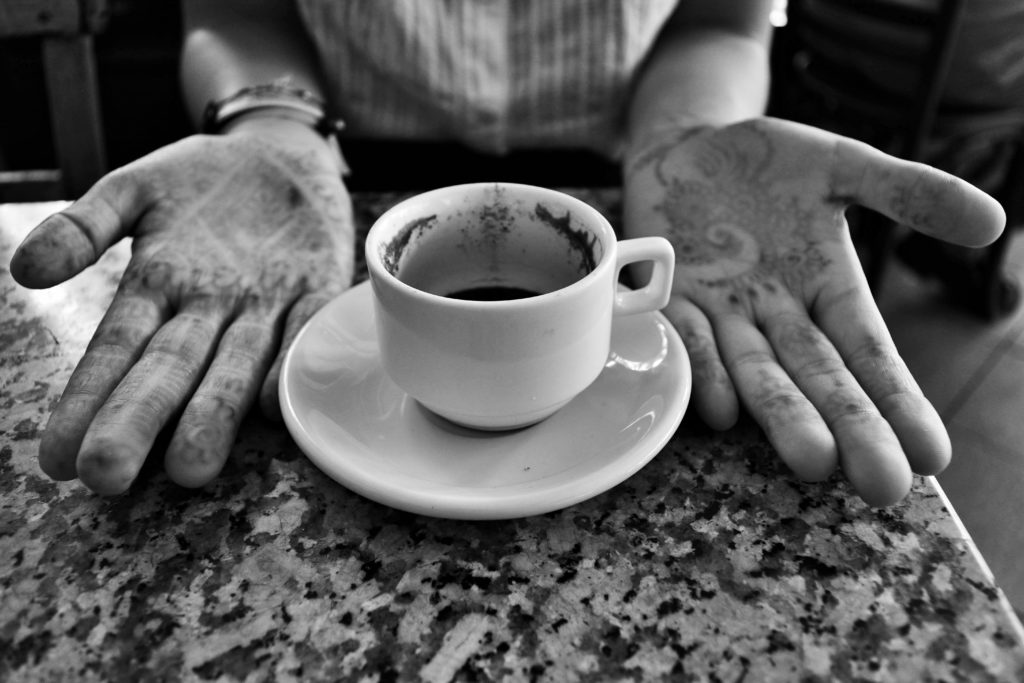
Rabab: I like that I come from North Africa and that I was born in Greece.
Athens, October 2019
Jackie
Until 2010, there was a blood law in Greece – the only chance for a child to obtain Greek citizenship automatically was to have Greek parents – Jackie Abhulimen, the spokeswoman for Generation 2.0 – an organization supporting representatives of the second generation of immigrants living in Greece, and an organisation which supports representatives of the second generation of immigrants living in Greece, explains the legal changes in the granting of citizenship which have taken place over recent years. – Current law offers access to citizenship for children born in Greece whose parents aren’t Greek and for those children who attend Greek schools.
However, the procedure for obtaining citizenship is long and subject to significant limitations, the most important of which are the need for parents to stay legally in Greece and the need for the child to attend a school that implements the Greek syllabus. People who don’t meet these criteria, e.g. children of parents who remain in Greece without appropriate documents, or children attending, for example, a private Polish school, cannot apply for citizenship in this way.
The term second generation is used to describe a group of people who share a history, a particular experience of growing up. We are children of the people who came here – Jackie explains. – We share the culture and identity of the country where we grew up with the experience our parents passed on to us. We are Greeks, but we are also something else. The culture of our parents, their struggles, the experience of emigration – all this automatically becomes our experience as well – she explains.
An important issue is also how we are perceived by the rest of society – she adds. It is easier for someone who may look like an ethnic Greek to blend in with the society than for those of us who come from African countries. I am never seen as a Greek. From the moment I leave the house people don’t speak Greek to me, they automatically assume I don’t know this language.
Skin colour determines the way we are perceived, it determines our experiences. Therefore, although I didn’t physically travel anywhere in Greece, in some way I travel every day when I leave home.
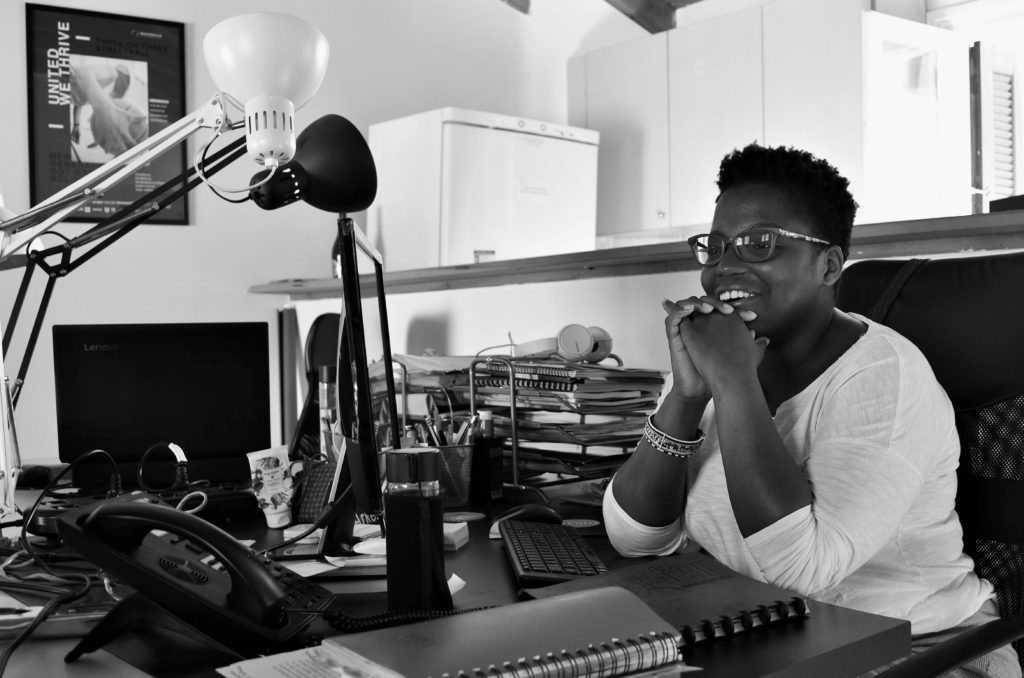
Jackie: I’m not just Greek, I’m Afro-Greek.
Athens, October 2019.
Andriana
Now, when somebody asks me where I am from, I always start by saying: my parents are from Istanbul, and then I add: but I was born here. I don’t know why, but I don’t like to say I’m from Athens. I was born and raised here, but I feel that if only I had said that I am from Greece, it wouldn’t be true.
Andriana’s parents are Vana and Yordanis – representatives of the Greek minority living in Turkey, who emigrated to Greece in the 1980s.
Both parents are from Istanbul. My father lived in the central Cihangir district of the city.Nowadays, it is a place full of art galleries and coffeehouses, but back in his time it was a Greek district – Andriana says. – My mother lived in a more wealthy district, near the Bosporus.
Indicating the reasons behind her parents leaving Istanbul, in particular, Andriana draws attention to the persecution which has become an experience not only for her family but also for many other inhabitants of the city. – My father’s grandfather had a tailor’s shop, which was burned down during the massacre in September 1955. Times were difficult not only for the Greeks but also for Armenians and representatives of other minorities.
One day, when Andriana’s father was 18, the police knocked on the door of his house. – They went inside and started screaming. They said our family wasn’t part of the Turkish community that we were supposed to get out. They gave Grandpa 14 hours to pack and leave the house.My grandfather hadn’t choice – they left Istanbul with his father, his sister, and great-grandfather.
Mom was more fortunate – she didn’t have to emigrate, but her family decided to leave the city after the time when most of their friends and other Greek families had left.
After arriving in Greece, Andriana’s father worked two shifts, went to university, and finally, years later, he opened his own accounting office, where Andriana now also works. At first, Andriana’s mother helped her husband at work, and later she dedicated herself to bringing up her two daughters.
Andriana recalls her school days as a memory when for the first time she felt badly treated because of her background. – In the fifth grade, during geography lessons, the teacher asked us one by one where we were from.We approached the map of Greece one after another, showed our place of origin ,and talked a few words about it. When it was time for me, the teacher asked – Andriana, where are you from? „From Istanbul,” I replied. It was the first time I said it out loud. – And where is Istanbul? She asked further. „Here,” I replied, pointing to the point on the wall where Istanbul would be if the map was large enough. – Okay, you can sit down – the teacher said. I sat down even though, just like other children, I wanted to say something more about the place where I come from.
When I came back home, I told my parents what happened at school. I told them that I understood that I was not Greek. – But, you are Greek! – they replied.My father was very agitated. – Who told you that? The teacher? – he asked. – Andriana explained – earlier, at school, other children used to call me Turkala (Turkala is a Greek word for „Turkish girl”) – when I was younger I had darker skin – she interjected – but it never bothered me before. My parents always told me good things about Turkey. If the other kids wanted me to be Turkala, I could be Turkala. When the teacher stopped me from speaking and told me to sit down, it was something else, then for the first time, I felt that something wrong had happened.
According to Andriana, her parents deal with the experience of emigration in different ways. – My father goes to Istanbul all the time.It’s like an addiction to him. He no longer has family or friends there, he goes there as a tourist – he walks the streets, visits places which he used to know. Unfortunately, after years of political and social turmoil, Istanbul isn’t longer the way he remembers it. My father hasn’t witnessed the changes that are taking place there, and that is why he feels like a stranger there now – Andriana says.
When it comes to my mother, after she left the city, she visited Istanbul only once. We went there with the whole family. From that trip, Andriana remembers best the day when she and her parents decided to see her mother’s old house. – Mum went to check the list of names on the intercom. She wanted to see if she would recognize any of them. I told her -Mom, it’s been 25 years, you don’t know anyone here anymore. She went anyway and realized that her old apartment was now occupied by her pediatrician, who was her mother’s best friend. So we decided to call him. An elderly man opened the door for us, looked at my mother standing in the doorway, but he didn’t recognize her – when he saw her last time she was 14 years old. Mom recognized him immediately and started crying immediately. „It’s me,Vana,” she said after a moment. The doctor looked at her more closely and started crying too. When he invited us inside, we all cried – Andriana laughs.
The visit to my mother’s old house was the most extraordinary and moving event I have ever seen in my life, one of those moments that you remember for the rest of your life.
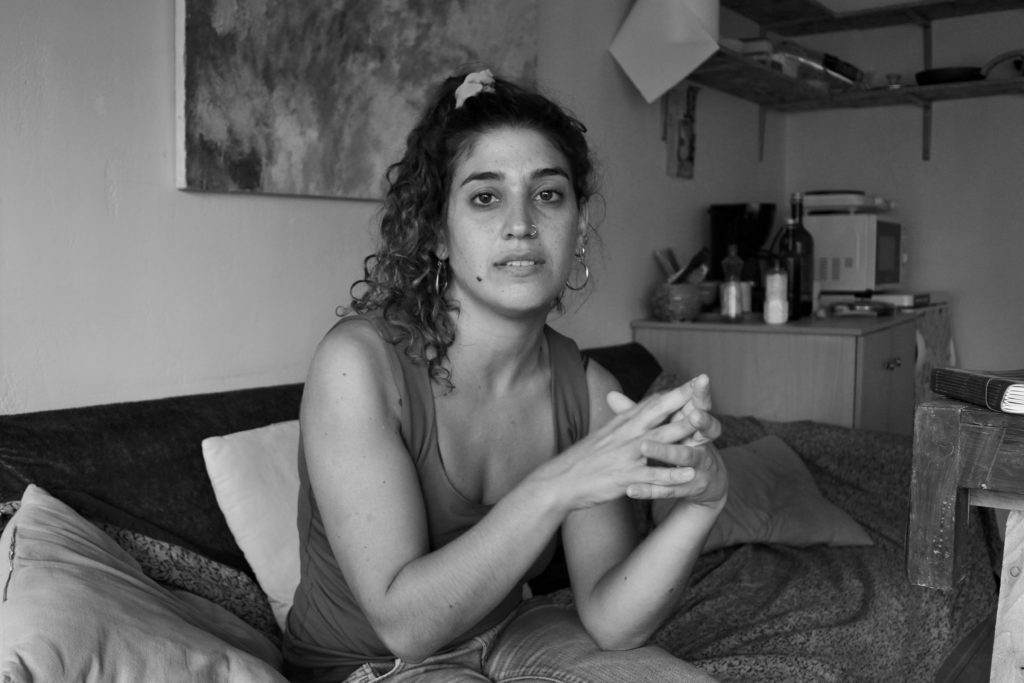
Andriana: Sometimes I say that I don’t belong to any place.
Athens, October 2019.
Spiros
When communism in Albania fell, everything else fell with it. The situation in the country was so difficult that, when the borders were opened in 1991, many people from Albania decided to go to Greece to look for work.My father was also among them – Spiros says. At first, my father thought he was only leaving for a few years, but when the situation in Albania got even worse in 1993/1994, we had a kind of civil war in the country at that time, my parents said that we would be safer if we all moved to Greece. So I am also a kind of refugee – Spiros laughs.
The Spiros family comes from a Greek minority living in southern Albania. – In the past, our village, and the whole area, was inhabited by Greek Christians. After the Second World War, when new borders were established, the northern part of the Greek Epirus, including the village where grandparents lived, was on the Albanian side. So my parents and I were born in Albania.
After arriving in Greece, the Spiros family initially settled on the islands, but after a few years, his parents decided to move to Elefsina, persuaded by other family members. – Elefsina is a town near Athens, where there is a lot of industry and where many immigrants and Greeks who came from other parts of the country work – Spiros explains.
My father always worked hard – in Albania, in a mine; when he came to Greece, on a construction site; then in Elefsina, as a factory worker. Despite this, it was not easy for him to feed six people, so my mother decided to find a job too. At first, she cleaned staircases, then she started working as a senior carer. We were rather a poor family, but my father did his best to provide us everything we needed.
The fact that he is different, Spiros felt for the first time when he went to school. – The children from Albania told me: You are Greek! Greek children said: You aren’t Greek, you are Albanian! And I was thinking – Who the hell am I then?
I also had a problem with my teachers, mainly because I wasn’t baptized. My parents were communists and therefore they didn’t baptize me. I was lucky and I am glad that they didn’t do it, but when I was little, I wasn’t at all happy. I was the only child in the whole school who didn’t go to religion. For an hour I had to sit alone in front of the classroom waiting for the classes to finish. As a result, for many teachers, I have become „the boy who doesn’t go to religion”. Some children laughed at me and they said that I stink because I wasn’t oiled at baptism. Such nonsense – Spiros nods his head to confirm his own words.
After moving to Elefsina, I decided to choose my friends from among children who weren’t Greek just like me. I began to hang out with other immigrants from Albania, Poland, Pakistan.
Spiros started to have problems with the police when he turned 15. – We started to hang out after school with the boys in the square near our house, and every time a police car passed by, the police stopped, the policemen went out, they asked us about our papers and then they took us to the police station to see if everything was OK with our documents – Spiros says. – The first few times I was very scared, I didn’t know what was going on. They kept us at the station for a few hours and then released us. The same police officers detained us even several times a week. I was 15 years old and I couldn’t leave the house without documents. Until now, I don’t know why they did this to us.
Regular detentions made Spiros and his friends treat their interactions with the authorities like a game. – During the day we allowed them to write down our personal data, in the evenings we threw stones at their cars or painted graffiti on police cars. Because of the way they treated us, I started to hate the police, I left the communists and became an anarchist – Spiros adds with a smile. When refugees started arriving in Greece in 2015, my house was full – people from all over the area brought us clothes and food, they wanted us to give them to those in need. At that time, we all thought that we had to do something because we were in this situation once too. It was a very moving time for us. One day an elderly couple visited us. They came to our house, spread their purchases on the table ,and began to divide them: Well we will keep two tomatoes, we will give two tomatoes to the refugees; they split all their purchases anyway. I was standing there, looking at it and thinking to myself – damn it, this is just solidarity.
If you ask me whetherI feel Greek or Albanian, I will answer that neither of them. However, in different situations, in various ways, I try to use my story, for example, when I talk to refugees, I have been working with them for four years and I often tell them that I am from Albania. I am trying to tell them – I am also an immigrant, a refugee, and see what I do, you can work like that too.
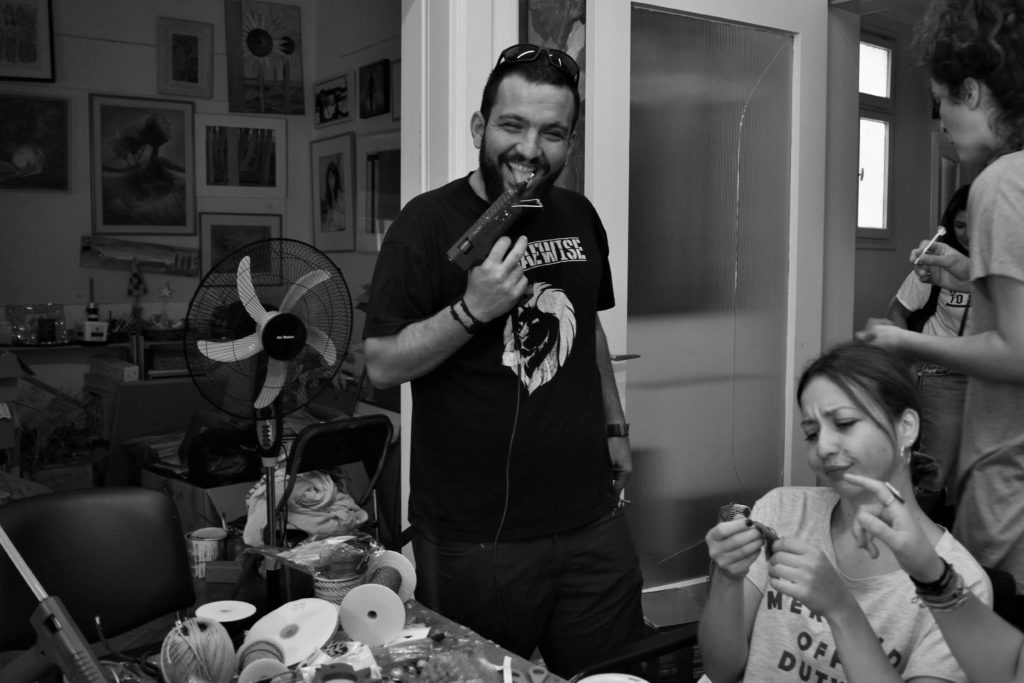
Spiros: If you ask me where I am from, I will answer that from Elefsina.
Athens, October 2019.

